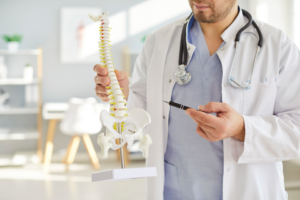Advanced arthroscopic knee cartilage and ligament reconstruction (ACL) surgery techniques may allow return to activity after an injury. However, patients may have anxiety regarding pain and the possible use of narcotic pain medication after surgery. The current opioid crisis in the US has brought attention to these issues. Our new approach has led to significant improvement in the recovery from knee surgery.
Effective pain management is critical for expedited recovery, rehabilitation goals, and patient satisfaction. Previously, nerve blocks performed by anesthesiologists can be uncomfortable when performed with an awake patient and frequently lead to a “pain rebound” when the block wears off. This pain oftentimes occurs in the middle of the night after surgery, adding more distress to the patient and family. Additionally, those techniques may lead to prolonged leg weakness (femoral nerve block) or incomplete pain relief (adductor canal block). Opioid (narcotic) pain medication is USUALLY then prescribed to address these shortfalls.
The ideal anesthetic for outpatient surgery should block only the sensory nerves for pain and not the motor nerves that control the muscles of the leg. Adequate pain control could then limit the need or dispensing opioid medications after surgery.

Through extensive research, we have developed a new and effective anesthetic for the knee. Our “anterior genicular nerve block” is performed by the surgeon at the end of surgery while the patient is still asleep, eliminating this discomfort. The genicular nerves provide sensation to the knee (see figure 1). Their anesthetization does not lead to muscle weakness. Our research (see referenced article) has proven this block to be very effective for pain control with a high patient satisfaction, even in some of the otherwise traditionally painful knee surgeries. In addition, there was no “pain rebound” in the middle of the night for these patients.
Many or our patients are able to recover without the use of any opioids. In addition, this is the first study to address adolescent opioid use after anterior cruciate ligament (ACL) reconstruction. We consider this is a significant achievement, especially in the vulnerable adolescent population undergoing surgery.
Read more from Dr. Caldwell on opioids https://www.sun-sentinel.com/sports/fl-sp-hyde-caldwell-opioids-20180607-story.html




